European airframer Deutsche Aircraft is preparing to unveil the first of three testbed aircraft for its reduced-emission D328eco regional airliner programme as it targets 2027 for certification and entry into service. In an increasingly challenging market for new turboprop aircraft and low-or-no-emission propulsion systems, the company has strategically based its new 40-seat model on an existing airframe, the 34-year-old Dornier 328, powered by Pratt & Whitney Canada PW127XT-S engines capable of operating with 100% sustainable aviation fuel. The D328eco is designed to increase passenger capacity by 25% over its 32-seat predecessor while reducing by 14% the fuel consumption per passenger. By evolving an in-service design with a 2.2 metre fuselage stretch and adding upgraded engines, avionics and lightweight cabin fittings and seats, Deutsche Aircraft is confident it can significantly shorten its path to certification and commercial deployment compared to competitors pursuing more complex approvals of all-new airframes and powertrains.
“Obsolescence is becoming more and more of a problem in regional aviation,” said Nils Heuer, Sales Director for Deutsche Aircraft. “The market requires a replacement for very old aircraft very, very soon.”
The airframer says the D328eco could quickly provide regional airlines and special mission operators with a more efficient, lower emission replacement for out-of-production 30-40 seat aircraft such as the Saab 340 or early-model De Havilland Canada Dash 8s, for which there has been no natural successor. The company has already secured letters of intent from prospective customers for 34 of the new planes.
“We’re 100% convinced that this is a market that will develop,” said Heuer. “It’s much easier for us to bring the D328eco to market because we are relying on an existing airframe and proven technologies. That doesn’t make certification easy. But it does make it easier.”
Construction of the first D328eco testbed, designated TAC-1, is nearing completion at the Deutsche Aircraft plant in Oberpfaffenhofen, near Munich. The aircraft is scheduled to be publicly unveiled late in May, then to start ground testing in the lead up to its inaugural flight later this year.
The first two test aircraft are being constructed from existing Dornier 328 airframes for use in extensive evaluation programmes, while the third test plane will be completely new and used for final certification flying. It will also be the first plane manufactured at the company’s new production facility, now being constructed at Leipzig-Halle Airport in eastern Germany.
Deutsche Aircraft has acquired the type certificate for the D328, which first flew in 1991, entered commercial service in 1993 and ceased production in the early 2000s. It is certified in more than 80 countries, with 150 of the type still in service.
By comparison, apart from the world’s largest turboprop manufacturer, ATR, most competing new regional airliner programmes are offering all-new aircraft and electric or hydrogen propulsion systems, and several concepts have been redesigned, delayed or discontinued.
The D328eco will be powered by up to 100% SAF, said Heuer, once both the aircraft and alternative fuel are approved. But even without 100% SAF, it will still be able to use blends of up to 50%, enabling it to be quickly deployed in regional markets without the need for significant new charging or fuelling infrastructure required by electric or hydrogen-powered types.
“We have a dedicated team that constantly looks at new propulsion technologies and monitors how ready they are,” said Heuer. “We believe that the best way forward is to rely on existing infrastructure in terms of energy supply. At this stage, we feel SAF will be the solution for the next couple of decades.”
Deutsche Aircraft is a strong advocate not just for SAF, but for varieties produced via the power-to-liquid (PtL) pathway, so-called e-fuels, in which CO2 captured from the atmosphere or from the industrial source of emission is combined with green hydrogen to create synthetic fuel.
Late last year, the airframer partnered with engine maker Pratt & Whitney Canada to operate five flights designed to measure emissions and contrails from a D328 UpLift research aircraft powered by fully synthetic fuel. The tests were also used to help progress regulatory approvals for 100% SAF to power commercial flights.
A key element in jet kerosene is the aromatic compound, which reacts with polymer seals within aircraft engines, causing the seals to swell and help prevent fuel leakage.
But aromatics also produce particles of soot in engine emissions, which, in certain conditions, freeze into ice crystals to create climate forcing contrails. PtL fuel offers comparable efficiency to conventional jet fuels but has low or no aromatic content, significantly reducing the risk of contrail formation.
The test fights by Deutsche Aircraft and Pratt & Whitney Canada, in collaboration with the German Aerospace Centre (DLR), used Fischer-Tropsch synthetic paraffinic kerosene (FT-SPK) from South African renewable energy group SASOL as a proxy for future PtL fuels, as part of a drive by the airframer and engine manufacturer to progress regulatory approvals of 100% SAF for commercial flights. Currently, the maximum SAF content permitted for commercial flights is 50%.
Earlier this month, in Bodø, Norway, Deutsche Aircraft, Energi I Nord (North Energy Cluster) and BLU (Green Arctic Aviation Development) co-hosted an e-SAF conference in which they agreed to jointly advocate for approval of 100% SAF, establishment of a European book-and-claim programme to increase demand for and use of SAF, long-term regulatory certainty and the use of market-based measures including EU ETS to support development of e-SAF.
Image: Render of Deutsche Aircraft’s D328eco regional airliner



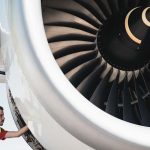


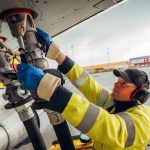
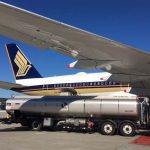

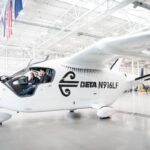

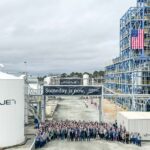



More News & Features
Swiss advanced SAF technology startups Metafuels and Synhelion reach project milestones
PtX fuels have significant Asia-Pacific potential but face many barriers, finds report
EU states to mobilise 500 million euro support for early-mover eSAF production startups
European Commission announces Sustainable Transport Investment Plan to advance low-and-no-carbon fuels
SkyNRG says e-SAF and carbon removals should not be competing strategies for aviation decarbonisation
Catagen launches SAF production company and signs offtakes with Ryanair and Shell